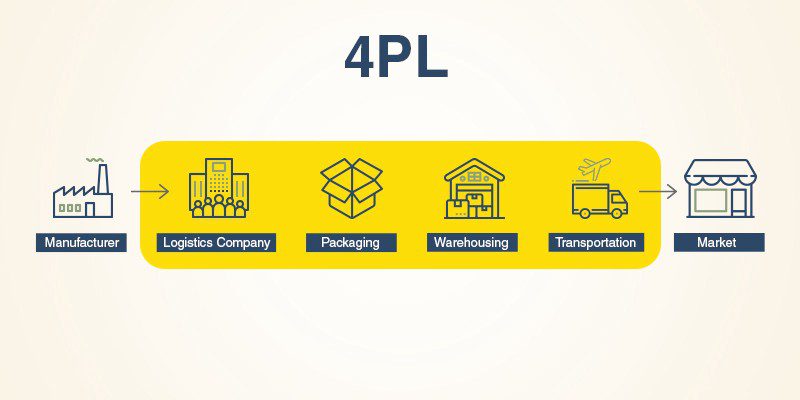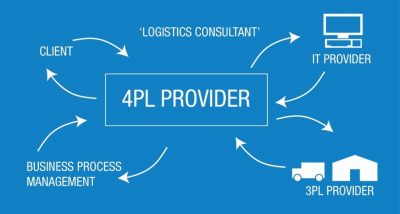Understanding Fourth Party Logistics ( 4PL) Completely
Table of Contents
Fourth Party Logistics – 4PL Service Provider
Fourth Party Logistics ( 4PL ) – Its Origination and Concept
Fourth Party Logistics Model ( 4PL ): The maker doesn’t just re-appropriate the association of its calculated undertakings to outsiders, yet in addition the administration thereof. Fourth-Party logistic providers frequently check the whole flexibly chain. The authoritative and official exercises are again frequently redistributed to different parties.
4pl service provider often have no means of transport and warehouses (non-asset based logistics). The fourth party logistic role demands intense involvement from the service supplier in the client’s business activities. After all, not only does the latter outsource the execution but also the monitoring of the logistic processes. The short-term thinking with collaboration agreements purely on the basis of cost-related reasons is replaced with long-term partnerships where quality of the service will play a primary role, and which involves shared risks and benefits.

Fourth Party Logistics – 4PL Service Provider
A 4pl service provider is a supply chain integrator. The 4PL assembles and manages all resources, capabilities and technology of an organisation’s Supply Chain and its array of providers.
An experienced and reliable 4pl service provider will bring value and a reengineered approach to your organisation as it will manage the logistics process, regardless of what carriers, forwarders or warehouses are used. As the centralised contact with the client, 4PL has overall responsibility for logistics performance and the ability to impact the entire supply chain and not just single elements. Consider how many discrete discussions you need to have in your company to ensure your product gets into consumers hands!
Fourth Party Logitics Origination
Some supply chain advances are revolutionary — digitalization, the big data explosion, the Internet of Things (IoT) and blockchain, for example. But others are more evolutionary, emerging from need and organic business growth.
Many companies are finding that their third-party logistics provider (3PL) simply can’t keep a handle on everything happening in their ever-more-complex supply chains. Hence, the evolution of the Fourth Party Logitics.
The concept of a Fourth-Party Logistics (4PL) provider was first defined by Andersen Consulting (Now Accenture) as an integrator that assembles the resources, capabilities, and technology of its own organization and other organizations to design, build, and run comprehensive supply chain solutions. Whereas a third party logistics (3PL) service provider targets a function, a 4PL targets management of the entire process.
Some have described a 4PL as a general contractor who manages other 3PLs, truckers, forwarders, custom house agents, and others, essentially taking responsibility of a complete process for the customer. A Fourth-party logistics provider can also be considered a consulting firm specialized in logistics, transportation, and supply chain management.

Fourth Party Logistics – 4PL Service Provider
Concept of Fourth Party Logistics (4PL)
Fourth Party Logistics works as the management layer which oversees activities of multiple 3PLs or 2PLs with whom an organization is, or will get associated with. In other words, a 4PL service provider integrates all types of resources or resource providers with respect to different attributes of the supply chain, and synchronizes their activities through IT systems. The three basic reasons why one should go for a 4PL service provider are –

Fourth Party Logistics – 4PL Service Provider
Blog Image: Impact of Coronavirus on Road Transport Industry in India
Solution Oriented Approach
One needs to appreciate that 4PLs aim at designing the solution first, with respect to the client’s requirements, wherein the designed solution encompasses the entire supply chain and not specific to a domain. The Fourth Party Logistics has an expertise of end-to-end operations relating to the warehousing, distribution, freight or IT, and addresses each aspect while designing the best fit solutions.
However, when companies directly approach separate vendors for their services and infrastructure requirements, they often end up procuring supplies which the vendors are keen to sell them, and may not necessarily be the optimal solution. So, the main advantage an organization can avail from a 4PL service provider is a solution based approach rather having a pre- built product which is customized specific for their business model.
Vendor Management
One of the biggest pain points of most companies, is the management of multiple vendors for same or different set of operations. Fourth Party Logistics service provider aims at resolving this issue by managing the complete eco-system of vendors required by the client covering all the aspects of the supply chain including procurement, warehousing, transportation, distribution and IT. In fact, as the Fourth Party Logistics is involved from the stage of vendor evaluation and onboarding, they also ensure that the right sets of systems, processes, and metrics are implemented so that the ongoing operations can be smoothly managed. This enables the companies to focus on their core business competency.
IT Enabled Supply Chain
While working with multiple services partners, a company usually receives some extent of IT reports to build insight and create visibility based on its partner’s capabilities. However, the key challenge lies in integrating the various reports into one single seamless report which provides it with end-to-end visibility.
This is another area where a Fourth Party Logistics adds significant value by setting up an end-to-end IT platform which integrates all information relating to the clients supply chain. The Fourth Party Logistics can provide the client with comprehensive reports, alerts, insights, etc. which helps the client to take decisions faster and more efficiently, thereby also generating significant competitive advantage.
Moreover working with a 4pl service provider you with several added flexibilities. Firstly, they can be hired for long term operations, or on project basis where they can manage the complete show for their client and then handover the operations to the client itself Secondly, as the4pl service provider is driven by value creation, they normally work on a nominal management fee, and profit sharing model. Thirdly, they become the single point of contact for all the operations and managements.
Leave a Replay

NAVATA ROAD TRANSPORT BLOG
In this Navata Road Transport Blog Covered Topics like- Fourth Party Logistics – 4PL – 4PL Service Provider




